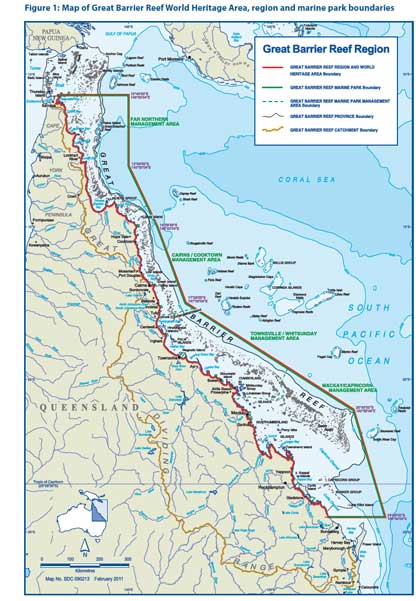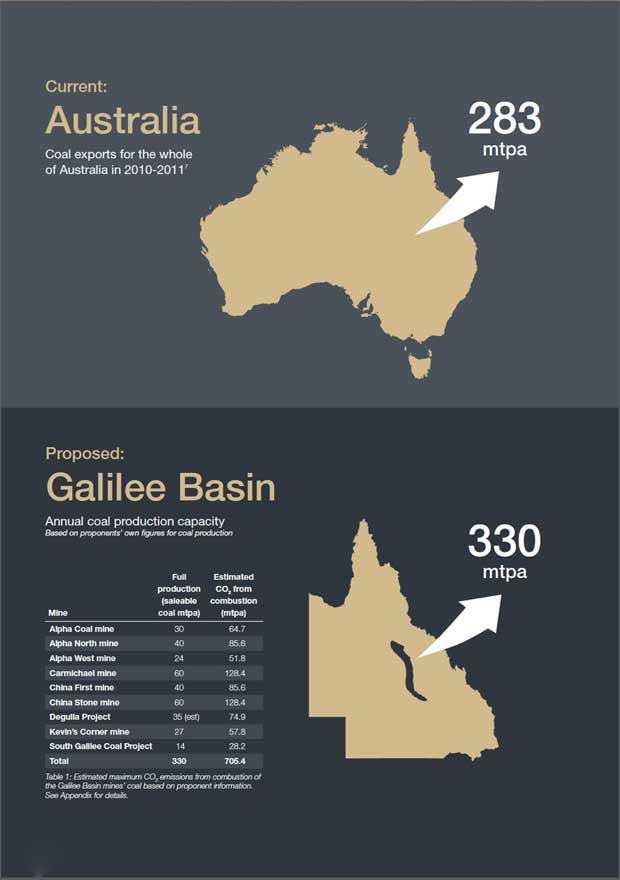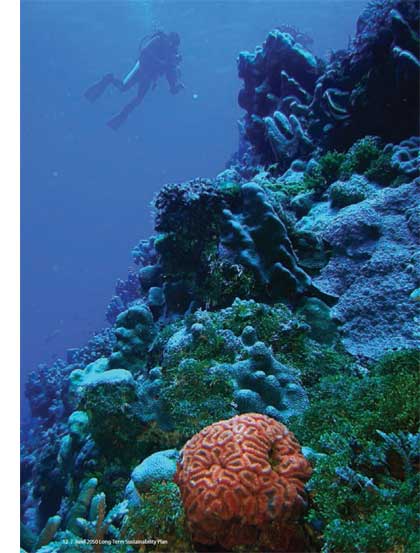Yesterday the Abbott government released the Reef 2050 Long-Term Sustainability Plan, the contents of which will be crucial in attempts to convince the United Nations World Heritage Committee not to list the Great Barrier Reef as ‘in danger’ later this year.
Like earlier efforts to protect the reef, the 2050 plan operates on a false logic of saving the nose to cut off the face.
While acknowledging climate change as the greatest long-term threat to the reef, it doesn’t once mention the nine mega-mines proposed for the Galilee Basin. At the same time, it makes some bizarre defences of Australia’s climate change policies, which have been roundly condemned by experts as inadequate.
The 2050 plan does improve the reef’s outlook in some areas, and incorporates new plans from the recently elected Queensland Labor government – plans which also carried the comforting promise of “environmentally sustainable development”.
To be fair, the state government’s proposals will secure better outcomes for the reef.

Dredge spoil – the sea-bed sucked up to create shipping channels – will not be dumped within the reef’s World Heritage Area. It won’t be dumped on the sensitive Caley Valley Wetlands, and it won’t be dumped at taxpayers’ expense.
New targets in the 2050 plan, of an 80 per cent reduction in nitrogen and a 50 per cent cut to sediment by 2025, are also positive steps forward.
And the federal government’s announcements will match the additional $100 million promised by the state government for the reef’s protection, while establishing a new independent scientific panel headed by the government’s chief scientist, Ian Chubb.
These are good developments. But there’s an elephant in the room – climate change – and these moves do nothing to address that fundamental problem.
“The biggest long-term threat to coral reefs worldwide is climate change and the Great Barrier Reef is no exception,” the report acknowledges.
“Damage to reefs as a consequence of climate change comes from ocean acidification, sea temperature increases, altered weather patterns (such as more intense storms) and rising sea levels.”
While some local forms of management can improve reef resilience to climate change impacts, they do not solve the broader problem.
Despite the fact “the feasibility of managing the climate sensitivity of ecosystems is becoming increasingly evident,” a recent paper prepared by several high-profile researchers and published in the journal Science makes is clear these reactive management techniques may be “too little, too late”.
Over the last decade governments have responded to multiple threats to the reef by banning fishing over 33 per cent of the Great Barrier Reef Marine Park, and making efforts to reduce runoff of nutrients, pesticides, herbicides, and sediment from land.
These “local interventions are no panacea for the threats of climate change,” the article in Science confirms.
The nine mines proposed for the Galilee will produce 705 million tonnes of carbon emissions annually if they reach maximum production. This would go on for decades.
“If the Galilee Basin was a country, burning all of its coal would make it the seventh largest emitter of greenhouse gas on the planet,” the Greens spokesperson for the environment, Larissa Waters, points out.
That’s more carbon emissions than the United Kingdom, Italy, South Africa, or Australia.

According to Waters, Professor Terry Hughes, a co-author to the Science paper and coral reef expert, “says digging up the Galilee Basin while keeping a healthy reef is an ‘impossible task’”.
“Dredging our Reef to enable more coal ships to treat it like a fossil fuel highway will come back to bite this precious global icon, which is already struggling from climate change, through more coral bleaching and ocean acidification,” Waters said.
The reef has already lost around half of its coral cover in the last three decades and the outlook, according to government scientists, is “poor and declining”. Whether the World Heritage Committee classifies the reef as ‘in danger’ or not, it is clearly already struggling.
The irony of the Abbott government defending our “proven track record of contributing to the international response to climate change” – while at the same time being the only government in the world to remove a price on carbon – is palpable.
The Coalition government’s defence of our “constructive participation” through the Kyoto Protocol John Howard refused for so long to sign, is at least incongruous.
And spruiking the more recent $200 million contribution Tony Abbott eventually tipped to the Green Climate Fund – after deriding it as a “Bob Brown bank on an international scale” – is a little bit desperate.
These, and the government’s ‘Direct Action’ plan, are the peanuts the Reef 2050 report proffers. Whether they will distract the World Heritage Committee from numerous Australian governments’ determination to aid and abet climate change remains to be seen.
The reality is, the bi-partisan plan to squeeze the last drops from Australia’s coal rush by opening up the Galilee will turn out to be a lemon.
A one-third increase in Queensland’s coal industry is not, by definition, “sustainable”. It is not something we can continue to do.
“With the coal price tanking, and the mining industry shedding jobs, the Abbott and Palaszczuk governments’ coal obsession doesn’t make economic sense either,” Waters said.

But these sort of doom-and-gloom observations, the Science paper warns, can backfire.
“Terms such as “extreme events” and “catastrophic transitions” may express the urgency of the matter, however social experiments reveal that accounts of disastrous future effects of climate change can invoke cognitive dissonance that causes many people to disbelieve climate change altogether.”
If one takes a kind view, this cognitive dissonance could be responsible for Australian politicians’ determination to tinkle around the edges and ignore the greatest threat to the reef, and most other ecosystems.
Bob Massie, a renowned American ‘doom-and-gloom-er’ who specialises in climate and finance, got to the crux of the matter at a recent talk in Sydney.
“Australia now holds the fate of the world’s climate in its hands,” he said.
“If your government and mining companies decide to develop all of the coal and gas currently planned, already on the books, our children will be forced to endure a world very different from what we know.”
By the government’s own logic, it could be a world without the Great Barrier Reef.
Donate To New Matilda
New Matilda is a small, independent media outlet. We survive through reader contributions, and never losing a lawsuit. If you got something from this article, giving something back helps us to continue speaking truth to power. Every little bit counts.



